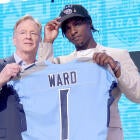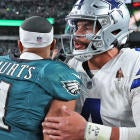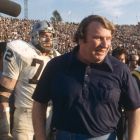Cowboys running back Ezekiel Elliott might not be missing much -- if any -- football this season after all. On Friday night, Elliott was granted a preliminary injunction, which means the NFL can't enforce the six-game suspension that the designated arbitrator, Harold Henderson, upheld on Tuesday.
From United States District Judge Amos Mazzant III's ruling:
Pending before the Court is Petitioner's Emergency Motion for Temporary Restraining Order or Preliminary Injunction (Dkt. #5). The Court has a very limited role in this case. The Court is being called upon to determine, at this preliminary stage, whether Dallas Cowboys running back Ezekiel Elliott ("Elliott") received a fundamentally fair arbitration hearing. The question of whether there was credible evidence of domestic abuse is not before the Court. Nor are any of the underlying facts in the dispute between Elliott and Tiffany Thompson ("Thompson"). Based upon the preliminary injunction standard, the Court finds, that Elliott did not receive a fundamentally fair hearing, necessitating the Court grant the request for preliminary injunction.
Key part: "Elliott did not receive a fundamentally fair hearing."
As my colleague (and a lawyer) Jared Dubin noted to me, the case before the court is not about the underlying evidence in the case and whether Elliott did or did not commit domestic violence. Instead, it's about whether the process by which the NFL suspended him and adjudicated his appeal was fundamentally fair to him.
The judge apparently did not believe the process was fair.
Judge Mazzant: “The NFL’s breach of the CBA is only compounded by Henderson’s breach of the CBA” pic.twitter.com/evnUrm6qiZ
— Daniel Wallach (@WALLACHLEGAL) September 8, 2017
Elliott's legal team agreed.
"We just learned of the Honorable Amos Mazzant's decision to grant Mr. Elliott's request for a preliminary injunction staying the NFL's six-game suspension," Elliott's attorneys wrote in a statement. "We are very pleased that Mr. Elliott will finally be given the opportunity to have an impartial decision-maker carefully examine the NFL's misconduct. This is just the beginning of the unveiling of the NFL's mishandling as it relates to Mr. Elliott's suspension. As the Court noted, the question of whether Mr. Elliott received a fundamentally fair hearing was answered ... 'he did not.' We agree."
As expected, the league did not agree and is weighing its legal options.
"We strongly believe that the investigation and evidence supported the Commissioner's decision and that the process was meticulous and fair throughout," the NFL said in a statement. "We will review the decision in greater detail and discuss next steps with counsel, both in the district court and federal court of appeals."
So, as of now, Elliott will be able to play for the Cowboys -- not just in Week 1, but beyond Week 1 as well. But that doesn't mean Elliott is officially freed from his suspension. It just means he'll be able to play while the matter gets sorted out in court. Eventually, Elliott could be forced to serve his suspension. But this is still a huge victory for Elliott and the Cowboys, because Elliott will likely be eligible for the entire season.
Remember, though, Tom Brady won the first round of his court battle with the NFL and he still ended up eventually serving his suspension.
While Ezekiel Elliott has won this round, Tom Brady and Adrian Peterson won the first round, too. Both ultimately served full suspensions.
— Michael McCann (@McCannSportsLaw) September 8, 2017
Elliott, who sued the NFL, is asking the Eastern District Court of Texas to overturn Henderson's ruling, claiming that there was a "league-orchestrated conspiracy by senior NFL executives ... to hide critical information." The judge wrote that "the denial of key documents and witnesses amount to serious misconduct by the arbitrator."
Elliott Judge:
— Dan Werly (@WerlySportsLaw) September 8, 2017
"the denial of key documents and witnesses amount to serious misconduct by [Harold Henderson]" pic.twitter.com/rWpkaRtIVp
As the Star-Telegram reported on Aug. 31, NFL lead investigator Kia Roberts testified during Elliott's appeal that she recommended that Elliott should not be suspended. Roberts was the only NFL employee who spoke to Elliott's accuser, Tiffany Thompson, during the investigation. However, Roberts pointed out during her testimony that she was never consulted about Elliott's suspension.
The judge noted the exclusion of Roberts' opinion:
Elliot Judge suggests that NFL investigator Lisa Friel and NFL lawyers intentionally withheld Kia Roberts recommendation for no discipline. pic.twitter.com/1xFHNBKq40
— Dan Werly (@WerlySportsLaw) September 8, 2017
Elliott judge (!!!): "had the NFL succeeded on its overall goal, [the Roberts withhold] would still be concealed from Elliott and the NFLPA" pic.twitter.com/arLCRYMvdv
— Dan Werly (@WerlySportsLaw) September 8, 2017
After the decision came down on Friday, the NFLPA released a statement that condemned the NFL's discipline process.
"Commissioner discipline will continue to be a distraction from our game for one reason: because NFL owners have refused to collectively bargain a fair and transparent process that exists in other sports," the NFLPA said in a statement. "This 'imposed' system remains problematic for players and the game, but as the honest and honorable testimony of a few NFL employees recently revealed, it also demonstrated the continued lack of integrity within their own League office."
Dan Werly, a sports lawyer, called the decision "one of the stronger court opinions I have ever read," which doesn't bode well for the league. Neither does this:
Judge does not even make the NFLPA post a bond. This means he doesn't believe the NFL has any chance of winning. pic.twitter.com/vueKvkJ8bH
— Frank Cawley (@Frank_Cawley) September 8, 2017
The NFL issued Elliott's six-game suspension last month due to alleged incidents of domestic violence against his then-girlfriend, Tiffany Thompson, in July 2016. Elliott almost immediately appealed the suspension, meeting with NFL commissioner Roger Goodell's designated arbitrator, Henderson, in New York last week. Henderson ended up upholding the suspension. After Elliott sued the NFL, the league responded by filing a motion to dismiss Elliott's federal case.
As our Will Brinson explained on Tuesday, Elliott still faces an uphill court battle. But getting the preliminary injunction was an important first step for Elliott.
Elliott, the fourth overall pick in last year's draft, led the league with 1,631 rushing yards in his rookie season.
![[object Object] Logo](https://sportshub.cbsistatic.com/i/2020/04/22/e9ceb731-8b3f-4c60-98fe-090ab66a2997/screen-shot-2020-04-22-at-11-04-56-am.png)



















